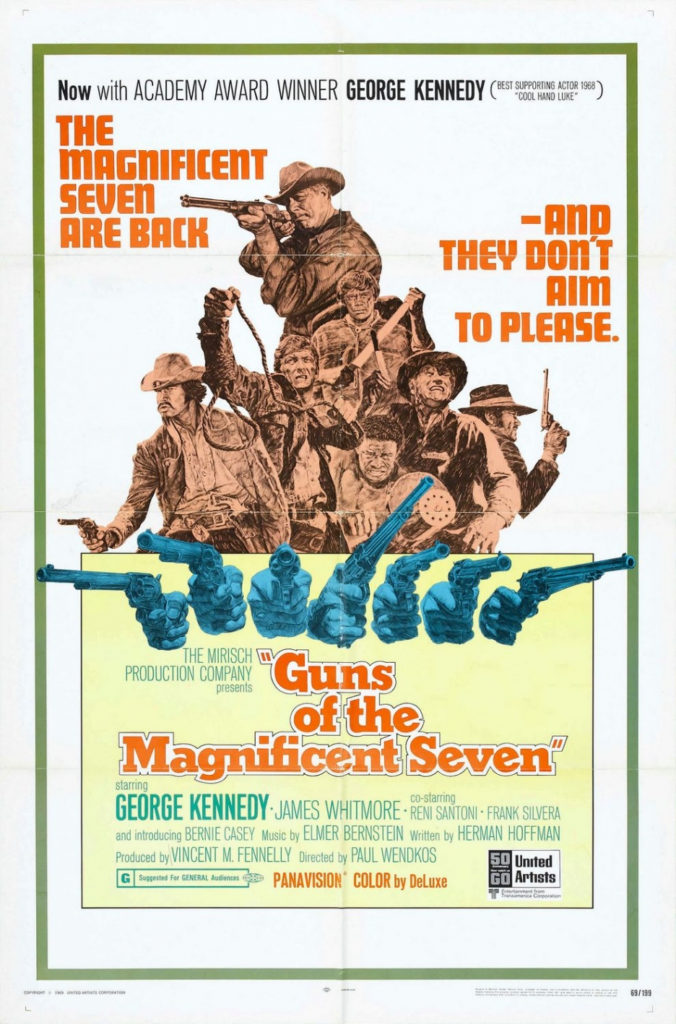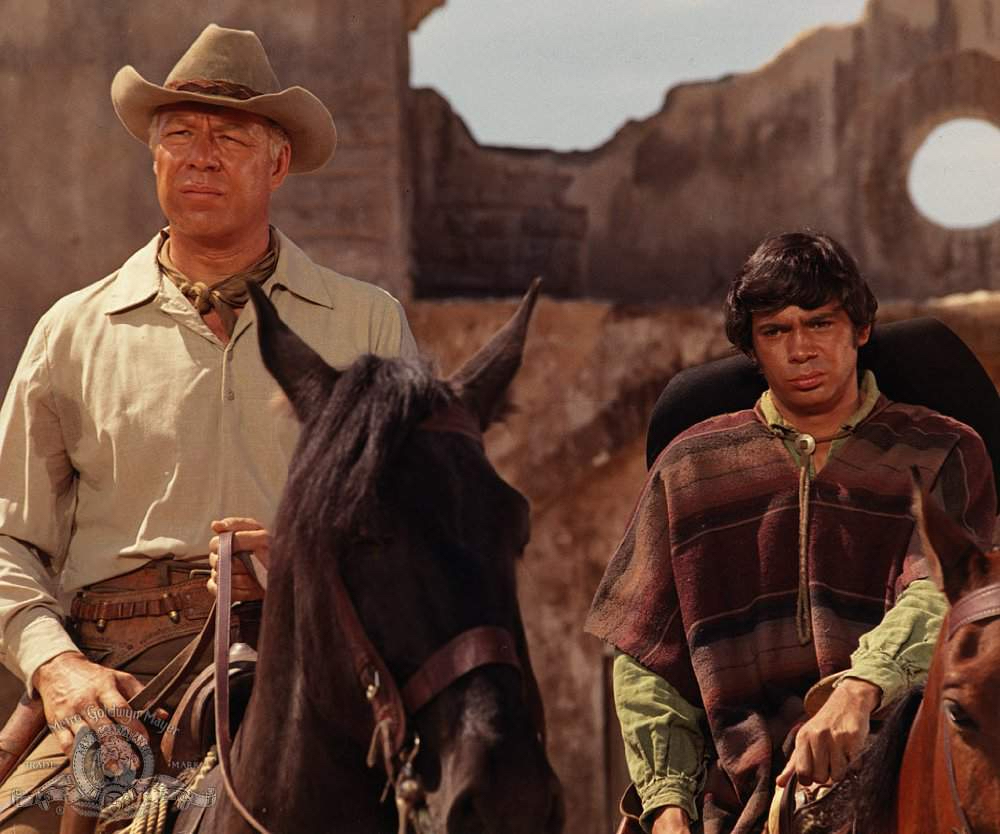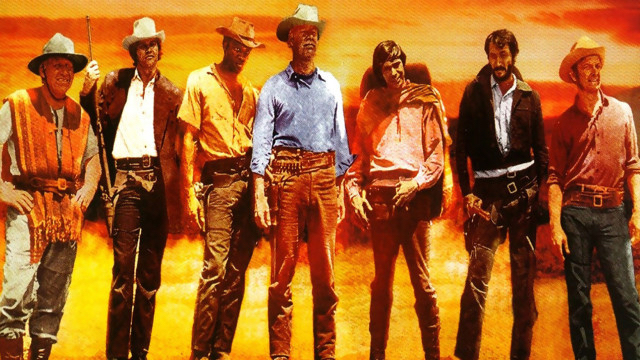The third entry in this — unusual — western series is, essentially, a remake of the first one. Nine years after the original, three years after the second adventure, the Mirisch Company tried again. Set in Mexico again (but shot in Spain again, like Return), an oppressed group under siege by a garrison of Federales led by a local martinet looks for help. Professional help. Six hundred dollars buys the services of six men, to stage a jail break to rescue Quintero, a Mexican leader and jump start a revolution against the martinet, Colonel Diego. Substitute the cruel local government soldiers for the band of banditos and the situation is pretty much the same for the poor Mexicans. And once again it is the violent Americans who sacrifice themselves to save the day.

The only recurring character is Chris, but this time he is portrayed by George Kennedy, a solid actor, but without the panache of Yul Brynner. Chris is minding his own business in a small town when, similar to the first film, he involves himself in an unusual local matter. This time, accused horse thief Keno (Monte Markham) is about to be hung; Chris suggests that the horse in question decide Keno’s fate. Soon Chris and Keno are getting to know each other when Max (Reni Santoni) offers them the job of springing the leader that the people need. Max describes himself as a cousin to someone Chris once helped — implied to be Chico — and gives Chris the six hundred dollars. Then it’s up to Chris to find the men he needs. Keno and Max make three. But Chris wants “six men — not enough to cause suspicion, just enough to do the job.”
Chris recruits the four others he needs as they travel south. Cassie (Bernie Casey, making his film debut) was working in a mine, but loses his job just as Chris rides in. Slater (Joe Don Baker) is a former rebel soldier with a useless left arm, but his right arm is lethal. Levi (James Whitmore) is very handy with a knife, but he also has a wife and child, and is reluctant to leave them. P. J. (Scott Thomas) is a seasoned gunfighter, but he is also tubercular, and may not be up to the challenge. Cassie and Slater are often at odds because of Slater’s casual racism and confederate ties, yet they gravitate toward one another anyway. P. J. is befriended and looked after by a Mexican woman. They all stay with the Mexican encampment in the hills while Chris tries to figure a plan. In the meantime, he returns the money to the Mexicans; when Quintero is freed, the Seven will have earned the money.
While this movie moves more slowly and deliberately than either of the first two, it encompasses a strategy and a sociology that the others do not. The strategy involves a fairly intricate plan for the jail break, developed over time as Chris scouts the jail and its surroundings. It involves attacking on a particular day, using the normal circumstances to their advantage, and it is very nicely worked out, culminating in the siege that climaxes the film.

The sociology aspect may be even more impressive. The Mexicans are tormented by the Federales, led by the martinet Colonel Diego (Michael Ansara). Diego repeatedly demonstrates his cruel nature, in one memorable scene by burying men up to their necks and then ordering his horsemen to sweep among them while Quintero is forced to watch. It is Quintero (Fernando Rey, who played the priest in the second film) whom the Seven are trying to rescue, and whom Diego is torturing in the jail. The other social aspect in play involves the other group of Mexican rebels, led by Lobero (Frank Silvera). Lobero and his men want to fight the militia, but Lobero wants glory, too. He wants to be made a general. Before the big battle Max tries to reason with him, but Lobero refuses to listen, putting self-interest before support for his people. Ultimately his men arrive to help, having left him behind.
Once again, the only winners are the poor Mexican farmers. Quintero is rescued, along with all the rest of the prisoners. Only three of the Seven stagger out of the jail compound alive. But bonds are made between the survivors and the farmers that will last forever. As Chico says in the first film, “Villages like this, they make up a song about every big thing that happens. Sing them for years.” That sentiment is even more convincing this time around, especially considering the men who do survive, and what they leave behind.

As in each of the earlier adventures, each of the Seven gets his own set of characteristics to differentiate him from the others, and to memorialize himself to the viewers. Levi is good with knives and befriends a young boy, Emil (Tony Davis), whose father is in jail. The boy’s full name is Emiliano Zapata; is he the future revolutionary leader? Perhaps; this would make an interesting origin story for him. Slater is the Rebel who gradually warms to Cassie, the strong black man. P. J. is ill, probably terminally so, who just wants to see some dignified action before he dies, while Keno is the “Vin” role, a sidekick to Chris who can keep his cool under pressure, offer some sage advice and shoot with deadly accuracy. Max, of course, is the “Chico” role, green as a gunfighter but, as he says, “I’m young, I’m strong, I’m angry, and I will learn.” Max offers several pithy comments during the story in Spanish, having to translate them for the gringos that surround him, and he is quite verbose. When he first meets Chris he calls him “as cool as the other side of the pillow,” a phrase later made popular by ESPN commentator Stuart Scott. This is the earliest reference I have ever heard to that phrase.
Because of the intricacy of the preparations necessary for the jail break sequence and greater detail to the characters themselves (courtesy of writer Herman Hoffman), I think this is slightly better than the previous entry, even without the presence of Yul Brynner. George Kennedy’s Chris is not as intense or charismatic, but he doesn’t rush into trouble; he thinks things through and lets his compatriots make their own decisions. I especially like Chris’ conversations with Colonel Diego. Chris is appropriately polite and agreeable, yet not quite submissive. He is obsequious enough to not rile the Federale officer, but an undercurrent of defiance and repugnance is most certainly present. It would have been nice to see Brynner back in the role, but Kennedy is a stalwart replacement, odd hair and all.
Guns of the Magnificent Seven is directed by Paul Wendkos, a journeyman director who mainly dealt with westerns and war films (including Attack on the Iron Coast in 1968, just prior to this film, written by Herman Hoffman), and a lot of television work. On the other hand, Paul Wendkos also helmed all three Gidget movies in the early 1960s! While there is little spectacular or trailblazing about his direction, it is economical and potent in places, and well suited to the needs of this movie. His sensibilities to the plight of the poor Mexican people are evident, from the shots of farmers hanging from telegraph lines to the caged wagons of prisoners being ferried through the desert. Each of the doomed mercenaries is, as with the earlier exploits, given a memorable send-off during the climactic battle, just as one would expect.
Elmer Bernstein returns with his famous themes for this film; his score is pretty much the same as was the first one, with slightly different orchestration, but no dramatically new themes. At least the music fits the action being presented onscreen, unlike the poorly edited Return of the Seven. It still thrills.
On its own, Guns is a decent film, one which exploits its story properly and with solid effectiveness. It naturally pales in comparison with the great original, with which it shares so many similarities, but it is better than the routine second movie and about equal to the surprisingly good fourth entry. ☆ ☆ 1/2. 22 November 2020.
